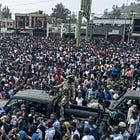Opposition figures cast doubt on US peace effort
Some prominent Congolese politicians argue that the Washington-driven process might be another non-solution to the conflict in eastern Democratic Republic of Congo.
Prosper Heri Ngorora in Goma

Kinshasa and Kigali were expected to present the US government with drafts of an agreement to end fighting each other on Friday, as agreed by their foreign ministers last week. But some prominent Congolese politicians argue that the Washington-driven process might be another non-solution to the conflict in eastern Democratic Republic of Congo.
Key opposition figures – Joseph Kabila, Martin Fayulu, Moïse Katumbi, and Delly Sesanga – released a joint declaration on Wednesday calling for internal dialogue “to enable the Congolese people to identify the internal and external root causes of the crisis and to find lasting solutions”. They back a peace effort driven by Congolese Catholic and Protestant prelates. All three opposition figures who signed the document are living in exile.
Lifo Fazili, a member of Katumbi’s political party Ensemble pour la République, told The Continent a peace deal agreed with Rwanda will not restore calm in the DRC. “Everything is discussed abroad while the conflict is indigenous,” he claimed.
On the streets of Goma, one of two Congolese cities that the M23 rebel fighters seized early this year, opinions are divided on the position taken by Kabila and others.
“This war is not between the DRC and Rwanda. Tshisekedi lied,” said Julien Kasereka, who sides with the opposition.
On the other hand, residents like Irene Sophie say opposition figures are speaking out of self interest. “If [they] were patriots, they would have advised us before the situation got any worse,” she said. “While we’re losing our towns, today they want dialogue … which is a distraction.”
President Félix Tshisekedi’s government maintains that former president Kabila has long backed the M23 rebels.
According to Reuters, the US is pushing Rwanda and the DRC to sign a peace accord in two months. It would include a deal for US companies to get access to mining and other opportunities in both DRC and Rwanda, on the logic that the presence of western investments would be a security guarantee for the region.
This week President Donald Trump succeeded in getting Ukraine’s President Volodymyr Zelenskyy to sign a similar deal, albeit with far fewer concessions than he originally insisted on.





